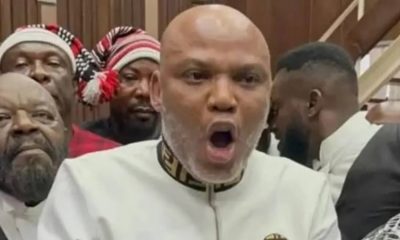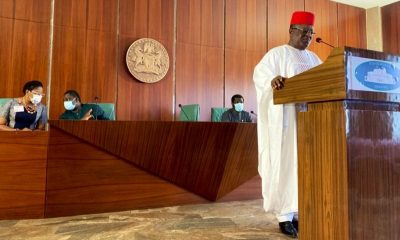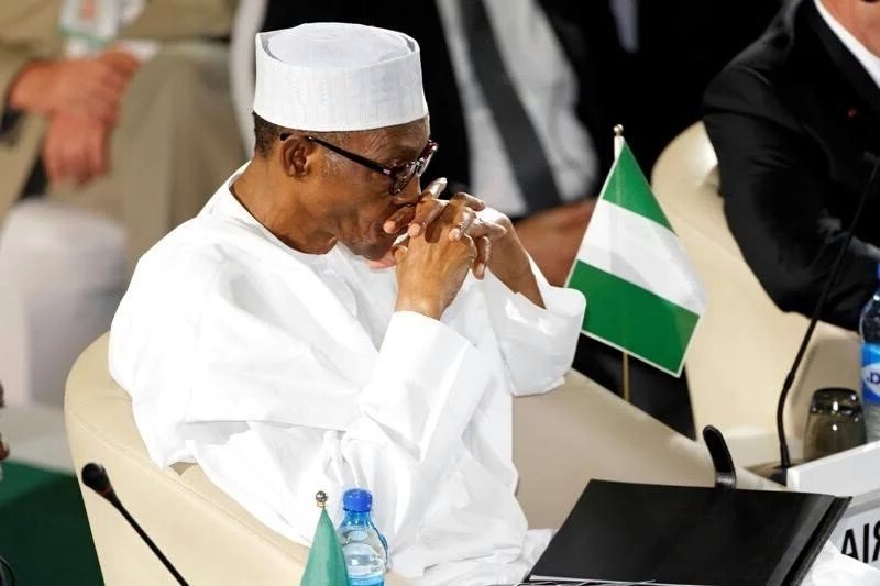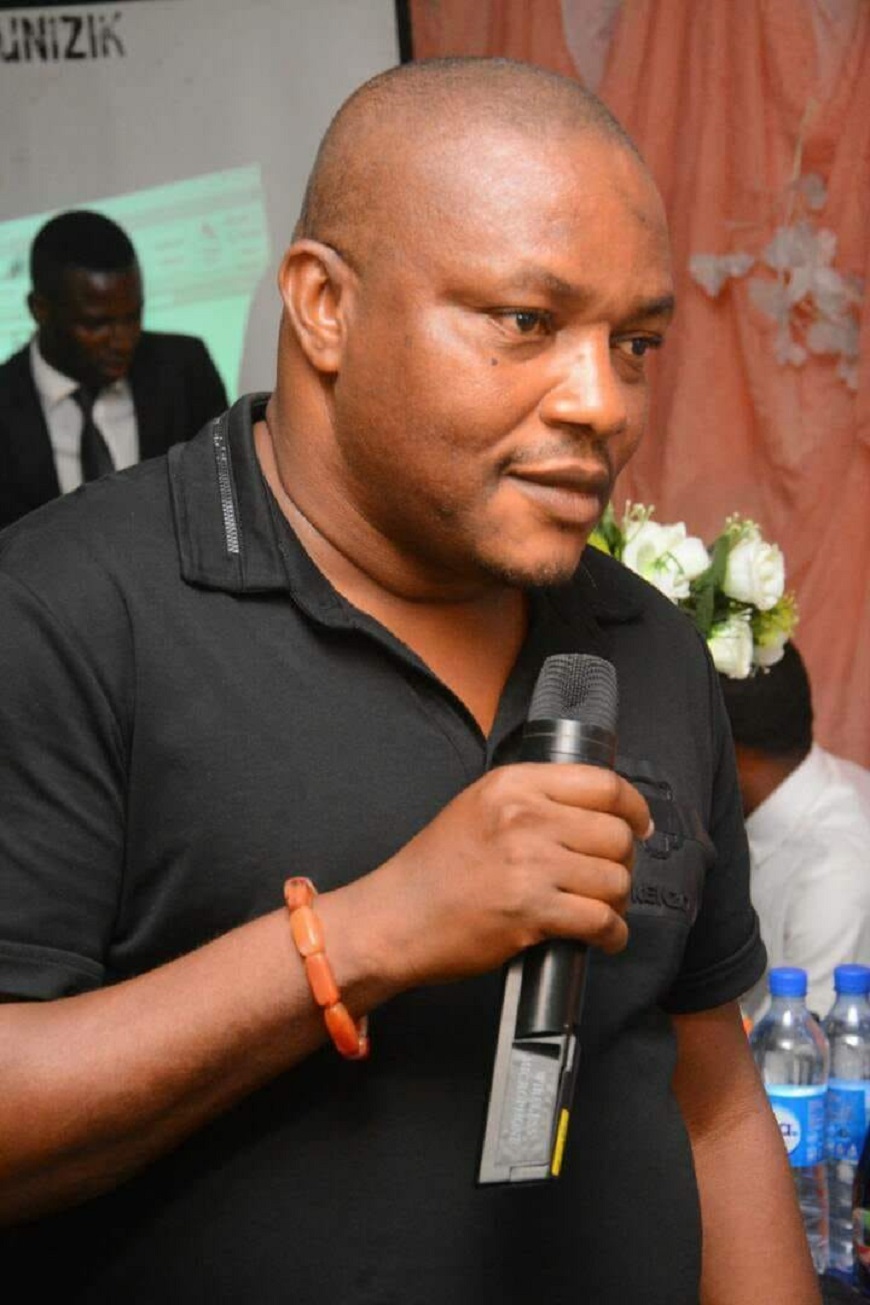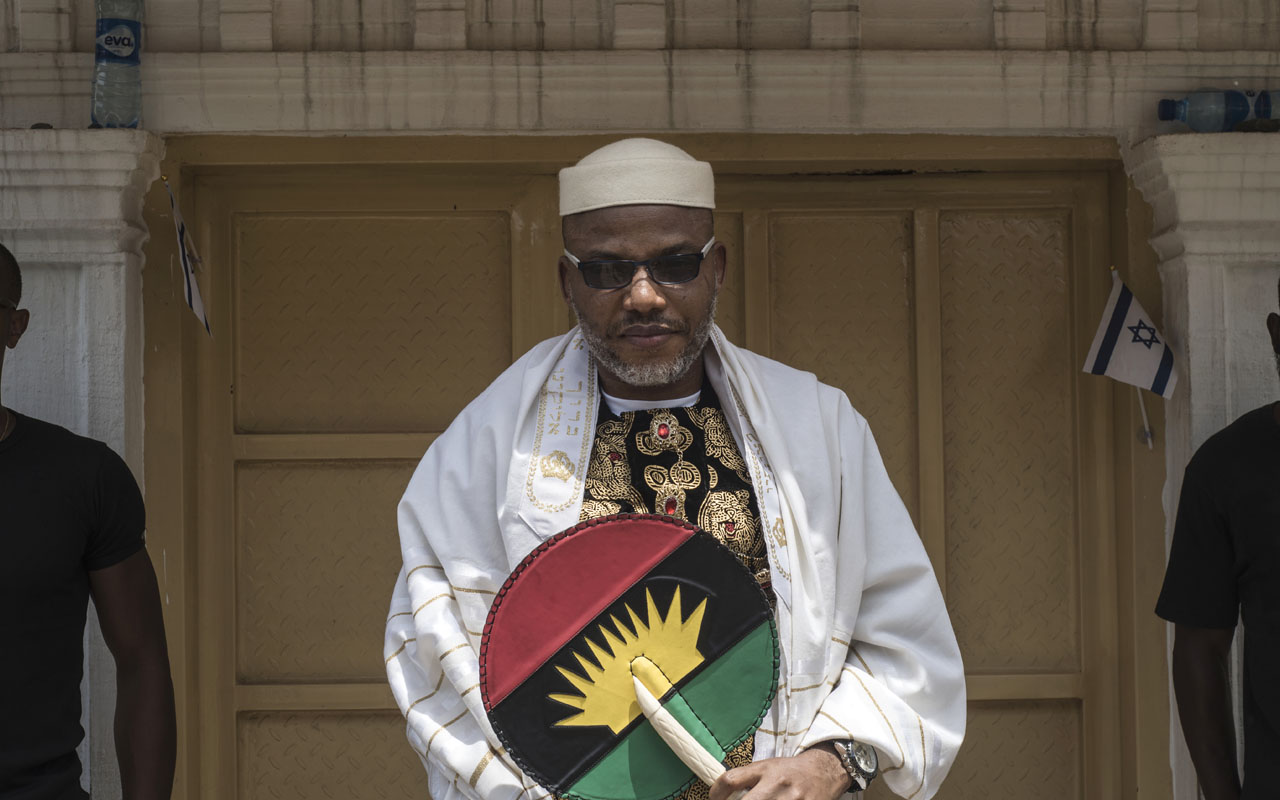World
Nigerians in Diaspora Hope for Biafra’s Political Autonomy
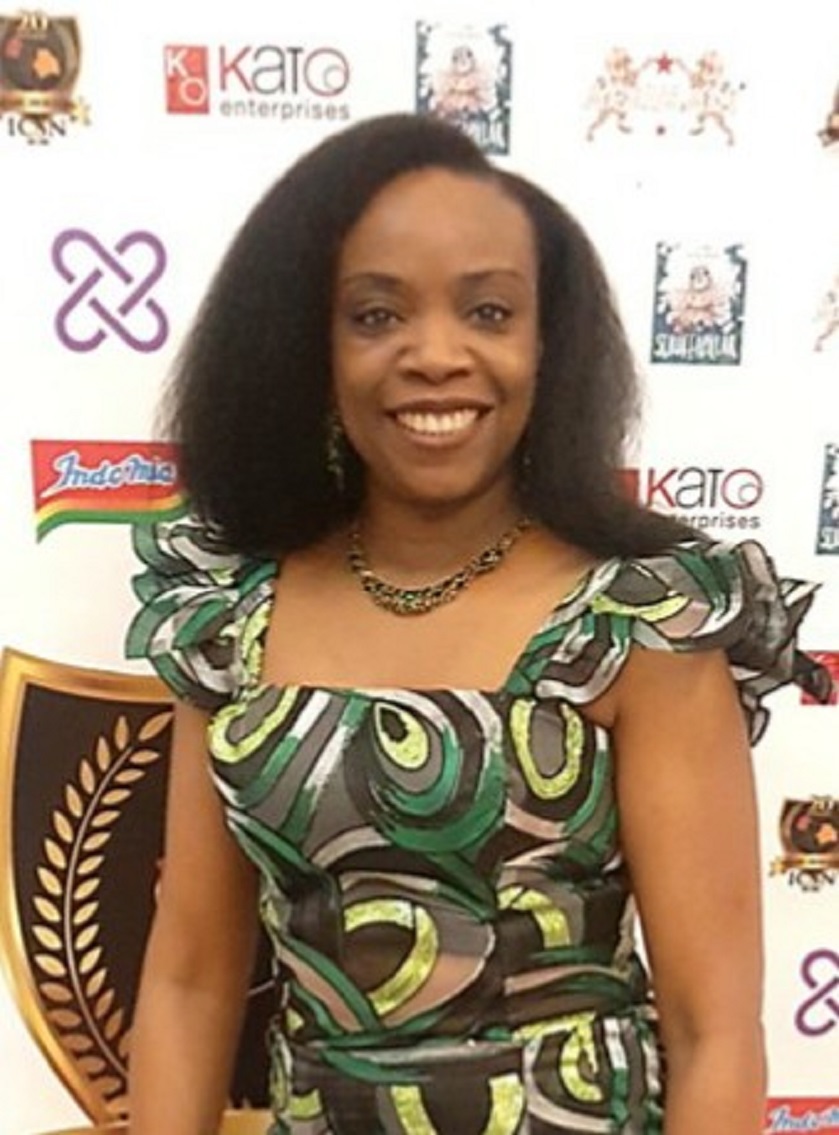
By Kester Kenn Klomegah
Several reports indicate that Nigeria has reached a critical level in its development as there are numerous problems, including frequent ethnic and religious attacks, deep-seated corruption, an ineffective federal system of governance despite being referred to as the Giant of Africa.
Nigeria is endowed with huge natural resources. By population, it has the highest and that signifies the extent of its human capital in the country.
As already known, Nigeria has three major ethnic groups namely the Hausa-Fulani in the North, Yoruba in the West and the Igbos in East. Ethnic conflict pulls down the expected high development, contributes to insecurity and youth unemployment.
Celine Akigwe, former General Secretary of the Nimo Brotherhood Society (NBS) UK & Ireland and now the Founder & CEO of Afristoricals and Creator of UmojApp, has given an interview in which she talks about some aspects of the existing problems and the need to drastically change the status quo in Federal Republic of Nigeria (FRN). Here are the interview excerpts:
As an enterprising Nigerian woman, who previously served on the Executive Committee as General Secretary of the Nimo Brotherhood Society (NBS) UK & Ireland, what would you say are the main problems facing Nigeria?
During my tenure as General Secretary of NBS UK & Ireland, I observed many behavioural patterns that were reflective of the psychology of the people of Nigeria. Over the years, I have sat on many Executive Committees, including the Igbo Cultural & Social Network (ICSN), which is the most progressive Igbo meeting in Europe. ICSN continues to produce vibrant, positive thinking young adults who will shape the future of our homeland.
After observing the various issues facing Nigerians over the years, the main problem facing Nigerians is the country called Nigeria itself. Since my childhood, from over a period of 40 years, I have always known dysfunctionality and infrastructural chaos that dominate the daily lives of the majority of Nigerians.
Nigeria exposes the rich and poor divide in every aspect of society. There have never been good roads for the masses, but as soon as you turn the corner to Ikoyi or Abuja or Banana Island, you see good roads. These areas enjoy constant electricity supply and good telecommunications networks that are alien to the rest of the population. The masses continue to suffer more and more electricity outages than what is provided, yet they are still charged for a service that is not provided.
Access to clean drinking water is another example, where the masses suffer poor quality water. When you factor in the case that the average wage is N25,000 per month, you can see how Nigerian society can only suffer from numerous problems. These are just the basic services that are everyone’s human right, yet in Nigeria, poor electricity, good roads, hospitals and schools have become the norm. Nigeria has become renowned as a place of corruption, criminality, dysfunctionality and infrastructural chaos.
The security situation all over Nigeria has reached a critical level. The numerous killings are tantamount to genocide and ethnic cleansing, which has been going on for decades. We have not seen any outcry from neither the Western nations nor the Eastern nations. In response to the killings, kidnappings, rapes and mutilation of innocent people, we see no reaction or response from our leaders. Nigerian leaders show absolutely no apathy to the plight of their citizens and subsequently, the rest of the world duly ignores the ongoing genocide.
There are too many problems facing Nigerians today that nothing short of a total rethink, revamp and reworking of every denomination of our civilization is required to change the status quo. This broken society must be dismantled and rebuilt.
From its very inception, the concept of Nigeria was doomed. The land that is referred to or called Nigeria was created by the British to make colonizing Africans easier for them to administer. In doing so, the rulers of Nigeria tend to be favoured individuals of the former colonial powers who are presented to the people as a choice to vote for.
Immediately after being elected, every President of Nigeria has obediently made their trip to the U.K. and then to America to seemingly meet with the leaders of those countries and receive their modus operandi for their forthcoming term in office.
I always queried why this was necessary and can only conclude that they are merely going to visit their puppet masters to ensure the colonial grip on Africa never fades.
Until this day, the British use their favourites to keep Nigeria alive, as do other European nations like France. We have never seen a European elected official leave their country to visit any African leader the same they are elected.
To add insult to injury, we learn the name Nigeria was invented by Dame Flora Louise Shaw or Lady Lugard as she was later known with her then-lover Lord Frederick Lugard, the British High Commissioner in Nigeria (1900–06) and Governor-General (1912–19) whom she later married. The end result was inevitable. There can be no peace in a nation that was created like that – ever!
As we have seen… most ethnic groups within the created administrative tool called Nigeria want to leave and form real nations by the people for the people. I think Africans deserve that right. It has taken over 60 years for Nigerians to reach this point of agitation and I think Nigerians have suffered enough. It is time to leave the past behind and cease the administration of the colony – not a former colony – called Nigeria.
Do you also think that women are particularly affected by all these challenges and problems that have engulfed the country?
It is overwhelmingly yes, women have been disproportionately affected by the challenges in many ways, especially during this pandemic. We have seen violence against women increase and incomes fall, not just in Nigeria, but globally.
For over 100 years, patriarchy was gradually imported into West African culture, first by the Fulani Moslems during the conquests of Othman Dan Fodio, and soon after by the British.
Traditional African society existed under a matriarchal system that recognized the African woman as the first to give birth to mankind and a return to matriarchal practices will go a long way to improving the condition of women in Nigeria. Discrimination against women does not occur in a matriarchy, which in no way diminishes the man’s role in society, rather, it enhances and empowers men to raise their standards and mindset.
In governance, no single leader should have the power to dictate laws that affect the wellbeing and progress of women directly or indirectly. This would require more women in senior positions in government, however, it would not be a case of appointing women into positions of power simply because they are women. It would be a case of allotting 50 per cent of the senior cabinet positions to women who qualified for these positions. We will see different results when there is an equal balance between men and women in the halls of power – and not just from the backbenches.
And what do you say about the youth generally?
The youth are the source of all changes. However, our elders have been trained to thwart the development of our youth and prevent them from thinking or even speaking. The youth are the lifeblood of civilization, but they have been let down by the government that has failed to provide the youth of Nigeria with adequate education that would give them a competitive advantage similar to what exist in the rest of the world.
Schools have been neglected, teachers are not paid on time and history had been dropped, which has resulted in what I call illiterate graduates. It is only those who are able to afford the high school fees, stand a chance of achieving something in their lives. The rise of horrible bribes including sex for results has rendered the Nigerian education system entirely dysfunctional and a playground for sexual predators.
We have seen an increase in suicide and rape in Nigeria and we can only commend the students of ASONIS in their campaign to raise awareness and eradicate suicide and rape from Nigeria. The lack of discipline from the top has filtered down to every spectrum of Nigerian society. The youth must rise up in unity by employing group psychology, which would lead to the return of the spirit of Ubuntu from the grassroots up.
What are your expectations from Nigerian women on the Diaspora? What are your suggestions and recommendations for women in other countries?
The role of women has been underestimated. It is the woman who raises the child, whether the child is male or female. But at times, Nigerian women are not empowered within the household to make the final decision about a child’s education or hobby. At times, the man is better equipped to make the final decision. Nigerian women in the Diaspora have an advantage in that they enjoy some protection and so may feel empowered to speak or make decisions, although this still carries some risk for Nigerian women in the Diaspora.
We have seen how excellently our women organise religious and educational institutions that were brought in by colonisation. On the other hand, when it comes to nation-building, many African women are unable to achieve this level of self-awareness and as a result, raise children who are desperate to move away from their culture or who view their own people in a negatively way. Those children will not think twice about investing in Nigeria.
The end result of all this is that we see many Nigerians in the Diaspora working hard to assimilate and invest in their host country’s property, projects and schools. You have to have an acute love and desire to invest and build in Igboland over Abuja or Lagos for example. Without that investment in itself, there can be no sustainable development and the majority of people will continue to want to leave, as we have seen down the years. Once self-pride is established, the children cultivate a love for the motherland and bless it with investment. This is, perhaps, one of the most important roles Nigerian women all over the world can play.
Do all these you have discussed above offer a tangible basis for Nigerians on Diaspora, for instance, in the UK & Ireland, to consider playing significant roles in the development process in Nigeria?
The process for sustainable development in Nigeria has to begin with the desire to change society with our own hands and own feet. Consistently lobbying European institutions such as the Commonwealth to intervene and miraculously resolve all the problems facing Nigerians will not bring around the change that is required for Nigeria. To change this anomaly, Nigerians in the Diaspora can play a significant role in fostering change by following aggressive investment strategies that would involve various community and commercial infrastructure development projects in various sectors in Nigeria.
In order to understand this, for instance, I developed UmojApp and AfriZone shop to bridge the gap between Nigerian businesses and consumers in the Diaspora. UmojApp also educates people on the significant achievements and events from an African perspective. So, the negative mindset of Africans, as a whole, view themselves as agents of change.
In a practical situation, Nigerians in the Diaspora understand the high risks involved in undertaking development projects in Nigeria. It would be for those who have a strong stomach and correct vision that will drive a change through investment in Nigeria.
As already known, Nigeria seems divided along ethnic and religious lines. What are your arguments about, say, integration or political autonomy for the Biafra State?
This really takes us full circle – back to my original answer. Nigeria is an administrative convenience to ease the complications for the British. If Africans are totally honest with themselves, all of the borders that were drawn as a result of the Scramble for Africa should be erased. Over a period of 38 years of war to claim African territory, one of the results was the country called Nigeria.
We must leave the past behind and draw our own map of Africa with our own boundaries to control our own future. Integration is to continue to live in a state of denial of the past. Independence is not a myth but a reality that will happen now or in the future. If this generation is not ready for true independence, then future generations will be, but only if we teach the children to love themselves and their African brothers and sisters.
World
AfBD, AU Renew Call for Visa-Free Travel to Boost African Economic Growth

By Adedapo Adesanya
The African Development Bank (AfDB) and the African Union have renewed their push for visa-free travel to accelerate Africa’s economic transformation.
The call was reinforced at a High-Level Symposium on Advancing a Visa-Free Africa for Economic Prosperity, where African policymakers, business leaders, and development institutions examined the need for visa-free travel across the continent.
The consensus described the free movement of people as essential to unlocking Africa’s economic transformation under the African Continental Free Trade Area (AfCFTA).
The symposium was co-convened by AfDB and the African Union Commission on the margins of the 39th African Union Summit of Heads of State and Government in Addis Ababa.
The participants framed mobility as the missing link in Africa’s integration agenda, arguing that while tariffs are falling under AfCFTA, restrictive visa regimes continue to limit trade in services, investment flows, tourism, and labour mobility.
On his part, Mr Alex Mubiru, Director General for Eastern Africa at the African Development Bank Group, said that visa-free travel, interoperable digital systems, and integrated markets are practical enablers of enterprise, innovation, and regional value chains to translate policy ambitions into economic activity.
“The evidence is clear. The economics support openness. The human story demands it,” he told participants, urging countries to move from incremental reforms to “transformative change.”
Ms Amma A. Twum-Amoah, Commissioner for Health, Humanitarian Affairs and Social Development at the African Union Commission, called for faster implementation of existing continental frameworks.
She described visa openness as a strategic lever for deepening regional markets and enhancing collective responses to economic and humanitarian crises.
Former AU Commission Chairperson, Ms Nkosazana Dlamini-Zuma, reiterated that free movement is central to the African Union’s long-term development blueprint, Agenda 2063.
“If we accept that we are Africans, then we must be able to move freely across our continent,” she said, urging member states to operationalise initiatives such as the African Passport and the Free Movement of Persons Protocol.
Ghana’s Trade and Industry Minister, Mrs Elizabeth Ofosu-Adjare, shared her country’s experience as an early adopter of open visa policies for African travellers, citing increased business travel, tourism, and investor interest as early dividends of greater openness.
The symposium also reviewed findings from the latest Africa Visa Openness Index, which shows that more than half of intra-African travel still requires visas before departure – seen by participants as a significant drag on intra-continental commerce.
Mr Mesfin Bekele, Chief Executive Officer of Ethiopian Airlines, called for full implementation of the Single African Air Transport Market (SAATM), saying aviation connectivity and visa liberalisation must advance together to enable seamless travel.
Regional representatives, including Mr Elias Magosi, Executive Secretary of the Southern Africa Development Community, emphasised the importance of building trust through border management and digital information-sharing systems.
Ms Gabby Otchere Darko, Executive Chairman of the Africa Prosperity Network, urged governments to support the “Make Africa Borderless Now” campaign, while tourism campaigner Ras Mubarak called for more ratifications of the AU Free Movement of Persons protocol.
Participants concluded that achieving a visa-free Africa will require aligning migration policies, digital identity systems, and border infrastructure, alongside sustained political commitment.
World
Nigeria Exploring Economic Potential in South America, Particularly Brazil

By Kestér Kenn Klomegâh
In this interview, Uche Uzoigwe, Secretary-General of NIDOA-Brazil, discusses the economic potential in South America, particularly Brazil, and investment incentives for Brazilian corporate partners for the Federal Republic of Nigeria (FRN). Follow the discussion here:
How would you assess the economic potential in the South American region, particularly Brazil, for the Federal Republic of Nigeria? What investment incentives does Nigeria have for potential corporate partners from Brazil?
As the Secretary of NIDOA Brazil, my response to the questions regarding the economic potentials in South America, particularly Brazil, and investment incentives for Brazilian corporate partners would be as follows:
Brazil, as the largest economy in South America, presents significant opportunities for the Federal Republic of Nigeria. The country’s diverse economy is characterised by key sectors such as agriculture, mining, energy, and technology. Here are some factors to consider:
- Natural Resources: Brazil is rich in natural resources like iron ore, soybeans, and biofuels, which can be beneficial to Nigeria in terms of trade and resource exchange.
- Growing Agricultural Sector: With a well-established agricultural sector, Brazil offers potential collaboration in agri-tech and food security initiatives, which align with Nigeria’s goals for agricultural development.
- Market Size: Brazil boasts a large consumer market with a growing middle class. This represents opportunities for Nigerian businesses looking to export goods and services to new markets.
- Investment in Infrastructure: Brazil has made significant investments in infrastructure, which could create opportunities for Nigerian firms in construction, engineering, and technology sectors.
- Cultural and Economic Ties: There are historical and cultural ties between Nigeria and Brazil, especially considering the African diaspora in Brazil. This can facilitate easier business partnerships and collaborations.
In terms of investment incentives for potential corporate partners from Brazil, Nigeria offers several attractive incentives for Brazilian corporate partners, including:
- Tax Incentives: Various tax holidays and concessions are available under the Nigerian government’s investment promotion laws, particularly in key sectors like agriculture, manufacturing, and technology.
- Repatriation of Profits: Brazil-based companies investing in Nigeria can repatriate profits without restrictions, thus enhancing their financial viability.
- Access to the African Market: Investment in Nigeria allows Brazilian companies to access the broader African market, benefiting from Nigeria’s membership in regional trade agreements such as ECOWAS.
- Free Trade Zones: Nigeria has established free trade zones that offer companies the chance to operate with reduced tariffs and fewer regulatory burdens.
- Support for Innovation: The Nigerian government encourages innovation and technology transfer, making it attractive for Brazilian firms in the tech sector to collaborate, particularly in fintech and agriculture technology.
- Collaborative Ventures: Opportunities exist for joint ventures with local firms, leveraging local knowledge and networks to navigate the business landscape effectively.
In conclusion, fostering a collaborative relationship between Nigeria and Brazil can unlock numerous economic opportunities, leading to mutual growth and development in various sectors. We welcome potential Brazilian investors to explore these opportunities and contribute to our shared economic goals.
In terms of this economic cooperation and trade, what would you say are the current practical achievements, with supporting strategies and systemic engagement from NIDOA?
As the Secretary of NIDOA Brazil, I would highlight the current practical achievements in economic cooperation and trade between Nigeria and Brazil, alongside the supporting strategies and systemic engagement from NIDOA.
Here are some key points:
Current Practical Achievements
- Increased Bilateral Trade: There has been a notable increase in bilateral trade volume between Nigeria and Brazil, particularly in sectors such as agriculture, textiles, and technology. Recent trade agreements and discussions have facilitated smoother trade relations.
- Joint Ventures and Partnerships: Successful joint ventures have been established between Brazilian and Nigerian companies, particularly in agriculture (e.g., collaboration in soybean production and agricultural technology) and energy (renewables, oil, and gas), demonstrating commitment to mutual development.
- Investment in Infrastructure Development: Brazilian construction firms have been involved in key infrastructure projects in Nigeria, contributing to building roads, bridges, and facilities that enhance connectivity and economic activity.
- Cultural and Educational Exchange Programs: Programs facilitating educational exchange and cultural cooperation have led to strengthened ties. Brazilian universities have partnered with Nigerian institutions to promote knowledge transfer in various fields, including science, technology, and arts.
Supporting Strategies
- Strategic Trade Dialogue: NIDOA has initiated regular dialogues between trade ministries of both nations to discuss trade barriers, potential markets, and cooperative opportunities, ensuring both countries are aligned in their economic goals.
- Investment Promotion Initiatives: Targeted initiatives have been established to promote Brazil as an investment destination for Nigerian businesses and vice versa. This includes showcasing success stories at international trade fairs and business forums.
- Capacity Building and Technical Assistance: NIDOA has offered capacity-building programs focused on enhancing Nigeria’s capabilities in agriculture and technology, leveraging Brazil’s expertise and sustainable practices.
- Policy Advocacy: Continuous advocacy for favourable trade policies has been a key focus for NIDOA, working to reduce tariffs and promote economic reforms that facilitate investment and trade flows.
Systemic Engagement
- Public-Private Partnerships (PPPs): Engaging the private sector through PPPs has been essential in mobilising resources for development projects. NIDOA has actively facilitated partnerships that leverage both public and private investments.
- Trade Missions and Business Delegations: Organised trade missions to Brazil for Nigerian businesses and vice versa, allowing for direct engagement with potential partners, fostering trust and opening new channels for trade.
- Monitoring and Evaluation: NIDOA implements a rigorous monitoring and evaluation framework to assess the impact of various initiatives and make necessary adjustments to strategies, ensuring effectiveness in achieving economic cooperation goals.
Through these practical achievements, supporting strategies, and systemic engagement, NIDOA continues to play a pivotal role in enhancing economic cooperation and trade between Nigeria and Brazil. By fostering collaboration and leveraging shared resources, we aim to create a sustainable and mutually beneficial economic environment that promotes growth for both nations.
Do you think the changing geopolitical situation poses a number of challenges to connecting businesses in the region with Nigeria, and how do you overcome them in the activities of NIDOA?
The changing geopolitical situation indeed poses several challenges for connecting businesses in the South American region, particularly Brazil, with Nigeria. These challenges include trade tensions, shifting alliances, currency fluctuations, and varying regulatory environments. Below, I will outline some of the specific challenges and how NIDOA works to overcome them:
Current Challenges
- No Direct Flights: This challenge is obviously explicit. Once direct flights between Brazil and Nigeria become active, and hopefully this year, a much better understanding and engagement will follow suit.
- Trade Restrictions and Tariffs: Increasing trade protectionism in various regions can lead to higher tariffs and trade barriers that hinder the movement of goods between Brazil and Nigeria.
- Currency Volatility: Fluctuations in the value of currencies can complicate trade agreements, pricing strategies, and overall financial planning for businesses operating in both Brazil and Nigeria.
- Different regulatory frameworks and compliance requirements in both countries can create challenges for businesses aiming to navigate these systems efficiently.
- Supply Chain Disruptions: Changes in global supply chains due to geopolitical factors may disrupt established networks, impacting businesses relying on imports and exports between the two nations.
Overcoming Challenges through NIDOA.
NIDOA actively engages in discussions with both the Brazilian and Nigerian governments to advocate for favourable trade policies and agreements that reduce tariffs and improve trade conditions. This year in October, NIDOA BRAZIL holds its TRADE FAIR in São Paulo, Brazil.
What are the popular sentiments among the Nigerians in the South American diaspora? As the Secretary-General of the NIDOA, what are your suggestions relating to assimilation and integration, and of course, future perspectives for the Nigerian diaspora?
As the Secretary-General of NIDOA, I recognise the importance of understanding the sentiments among Nigerians in the South American diaspora, particularly in Brazil.
Many Nigerians in the diaspora take pride in their cultural roots, celebrating their heritage through festivals, music, dance, and culinary traditions. This cultural expression fosters a sense of community and belonging.
While many individuals embrace their new environments, they often face challenges related to cultural differences, language barriers, and social integration, which can lead to feelings of isolation.
Many express optimism about opportunities in education, business, and cultural exchange, viewing their presence in South America as a chance to expand their horizons and contribute to economic activities both locally and back in Nigeria.
Sentiments regarding acceptance vary; while some Nigerians experience warmth and hospitality, others encounter prejudice or discrimination, which can impact their overall experience in the host country. NIDOA BRAZIL has encouraged the formation of community organisations that promote networking, cultural exchange, and social events to foster a sense of belonging and support among Nigerians in the diaspora. There are currently two forums with over a thousand Nigerian members.
Cultural Education and Awareness Programs: NIDOA BRAZIL organises cultural education programs that showcase Nigerian heritage to local communities, promoting mutual understanding and appreciation that can facilitate smoother integration.
Language and Skills Training: NIDOA BRAZIL provides language courses and skills training programs to help Nigerians, especially students in tertiary institutions, adapt to their new environment, enhancing communication and employability within the host country.
Engaging in Entrepreneurship: NIDOA BRAZIL supports the entrepreneurial spirit among Nigerians in the diaspora by facilitating access to resources, mentorship, and networks that can help them start businesses and create economic opportunities.
Through its AMBASSADOR’S CUP COMPETITION, NIDOA Brazil has engaged students of tertiary institutions in Brazil to promote business projects and initiatives that can be implemented in Nigeria.
NIDOA BRAZIL also pushes for increased tourism to Brazil since Brazil is set to become a global tourism leader in 2026, with a projected 10 million international visitors, driven by a post-pandemic rebound, enhanced air connectivity, and targeted marketing strategies.
Brazil’s tourism sector is poised for a remarkable milestone in 2026, as the country expects to welcome over 10 million international visitors—surpassing the previous record of 9.3 million in 2025. This expected surge represents an ambitious leap, nearly doubling the country’s foreign-arrival numbers within just four years, a feat driven by a combination of pent-up global demand, strategic air connectivity improvements, and a highly targeted marketing campaign.
World
African Visual Art is Distinguished by Colour Expression, Dynamic Form—Kalalb

By Kestér Kenn Klomegâh
In this insightful interview, Natali Kalalb, founder of NAtali KAlalb Art Gallery, discusses her practical experiences of handling Africa’s contemporary arts, her professional journey into the creative industry and entrepreneurship, and also strategies of building cultural partnership as a foundation for Russian-African bilateral relations. Here are the interview excerpts:
Given your experience working with Africa, particularly in promoting contemporary art, how would you assess its impact on Russian-African relations?
Interestingly, my professional journey in Africa began with the work “Afroprima.” It depicted a dark-skinned ballerina, combining African dance and the Russian academic ballet tradition. This painting became a symbol of cultural synthesis—not opposition, but dialogue.
Contemporary African art is rapidly strengthening its place in the world. By 2017, the market was growing so rapidly that Sotheby launched its first separate African auction, bringing together 100 lots from 60 artists from 14 foreign countries, including Algeria, Ghana, Mali, Nigeria, Senegal, and others. That same year during the Autumn season, Louis Vuitton Foundation in Paris hosted a major exhibition dedicated to African art. According to Artnet, sales of contemporary African artists reached $40 million by 2021, a 434% increase in just two years. Today, Sotheby holds African auctions twice a year, and in October 2023, they raised $2.8 million.
In Russia, this process manifests itself through cultural dialogue: exhibitions, studios, and educational initiatives create a space of trust and mutual respect, shaping the understanding of contemporary African art at the local level.
Do you think geopolitical changes are affecting your professional work? What prompted you to create an African art studio?
The international context certainly influences cultural processes. However, my decision to work with African themes was not situational. I was drawn to the expressiveness of African visual language—colour, rhythm, and plastic energy. This theme is practically not represented systematically and professionally in the Russian art scene.
The creation of the studio was a step toward establishing a sustainable platform for cultural exchange and artistic dialogue, where the works of African artists are perceived as a full-fledged part of the global cultural process, rather than an exotic one.
To what extent does African art influence Russian perceptions?
Contemporary African art is gradually changing the perception of the continent. While previously viewed superficially or stereotypically, today viewers are confronted with the depth of artistic expression and the intellectual and aesthetic level of contemporary artists.
Portraits are particularly impactful: they allow us to see not just an abstract image of a “continent,” but a concrete personality, character, and inner dignity. Global market growth data and regular auctions create additional trust in African contemporary art and contribute to its perception as a mature and valuable movement.
Does African art reflect lifestyle and fashion? How does it differ from Russian art?
African art, in my opinion, is at its peak in everyday culture—textiles, ornamentation, bodily movement, rhythm. It interacts organically with fashion, music, interior design, and the urban environment. The Russian artistic tradition is historically more academic and philosophical. African visual art is distinguished by greater colour expression and dynamic form. Nevertheless, both cultures are united by a profound symbolic and spiritual component.
What feedback do you receive on social media?
Audience reactions are generally constructive and engaging. Viewers ask questions about cultural codes, symbolism, and the choice of subjects. The digital environment allows for a diversity of opinions, but a conscious interest and a willingness to engage in cultural dialogue are emerging.
What are the key challenges and achievements of recent years?
Key challenges:
- Limited expert base on African contemporary art in Russia;
- Need for systematic educational outreach;
- Overcoming the perception of African art as exclusively decorative or ethnic.
Key achievements:
- Building a sustainable audience;
- Implementing exhibition and studio projects;
- Strengthening professional cultural interaction and trust in African
contemporary art as a serious artistic movement.
What are your future prospects in the context of cultural diplomacy?
Looking forward, I see the development of joint exhibitions, educational programs, and creative residencies. Cultural diplomacy is a long-term process based on respect and professionalism. If an artistic image is capable of uniting different cultural traditions in a single visual space, it becomes a tool for mutual understanding.
-

 Feature/OPED6 years ago
Feature/OPED6 years agoDavos was Different this year
-
Travel/Tourism10 years ago
Lagos Seals Western Lodge Hotel In Ikorodu
-

 Showbiz3 years ago
Showbiz3 years agoEstranged Lover Releases Videos of Empress Njamah Bathing
-

 Banking8 years ago
Banking8 years agoSort Codes of GTBank Branches in Nigeria
-

 Economy3 years ago
Economy3 years agoSubsidy Removal: CNG at N130 Per Litre Cheaper Than Petrol—IPMAN
-

 Banking3 years ago
Banking3 years agoSort Codes of UBA Branches in Nigeria
-

 Banking3 years ago
Banking3 years agoFirst Bank Announces Planned Downtime
-

 Sports3 years ago
Sports3 years agoHighest Paid Nigerian Footballer – How Much Do Nigerian Footballers Earn


